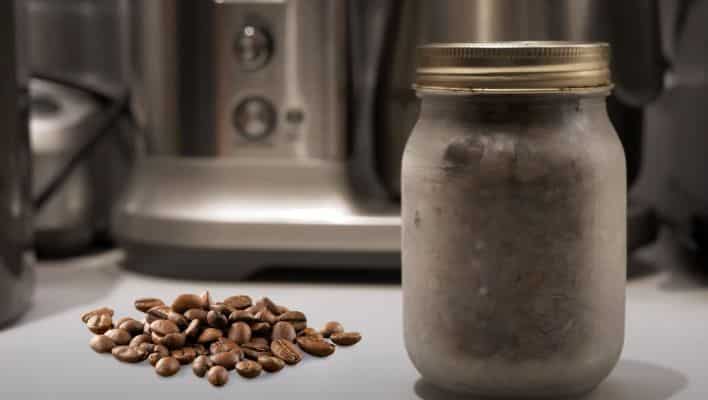Coffee typically lasts about 1 to 2 weeks when stored in the fridge. Introducing the element of cool temperature can help slow down the degradation process and preserve the flavor of the coffee for a longer period of time.
Proper storage plays a crucial role in maintaining the freshness of coffee. While some people opt for storing coffee in the fridge to extend its shelf life, it’s important to note that coffee is porous and can easily absorb odors and moisture from the surrounding environment.
As a result, the flavor of the coffee can be compromised if it’s not stored properly. In this article, we will explore the factors that influence the shelf life of coffee in the fridge and provide some tips on how to store coffee for optimal freshness and flavor. So, let’s dive in and find out more about the lifespan of coffee in the fridge.

Factors Affecting The Shelf Life Of Coffee
Temperature and humidity:
- The temperature and humidity levels in which coffee is stored play a significant role in determining its shelf life.
- High temperatures and excessive humidity can speed up the deterioration process of coffee beans, causing them to lose their flavor and aroma more quickly.
- Conversely, cooler temperatures and lower humidity can help prolong the freshness of coffee, allowing it to maintain its quality for a longer period.
- It is advisable to store coffee in a cool, dry place away from direct heat and sunlight to preserve its flavor.
Storage container:
- The choice of storage container can also affect the shelf life of coffee.
- Airtight containers are recommended as they help prevent moisture and oxygen from getting to the coffee, thus preserving its freshness.
- Glass jars or ceramic containers with tight-fitting lids are ideal for storing coffee, as they do not allow air or light to penetrate.
- It is important to avoid storing coffee in plastic containers or bags, as they may not provide the same level of protection against air and moisture.
Roast level:
- The roast level of coffee beans can impact their shelf life.
- Lightly roasted coffee beans tend to have a shorter shelf life compared to dark roasted beans.
- This is because lighter roasts retain more moisture, making them more susceptible to degradation over time.
- On the other hand, dark roasted beans have a longer shelf life due to the removal of more moisture during the roasting process.
- It is worth noting that regardless of the roast level, coffee is best consumed within a few weeks of roasting to ensure optimum freshness.
Remember, proper storage of coffee in the fridge can help prolong its shelf life, but it is important to consider these factors to ensure the best taste and quality. So, find a cool, airtight container and choose your preferred roast level for the perfect cup of coffee every time.
How Long Does Coffee Last In The Fridge?
If you’re a coffee lover, you might find yourself with leftover brewed coffee from time to time. To avoid wasting it, you might consider storing it in the fridge for later use. But how long does coffee actually last in the fridge?
Let’s dive into the details.
Maximum Freshness Period
Here’s what you need to know about how long coffee can stay fresh in the fridge:
- Ideally, coffee should be consumed immediately after brewing to enjoy its optimal flavor. However, if you have some leftover coffee, refrigeration can help extend its freshness.
- Generally, brewed coffee can last in the fridge for up to one week. This period can vary depending on various factors, such as the type of coffee, brewing method, and storage conditions.
- It’s important to note that the flavor of your coffee may slowly degrade over time, even when stored in the fridge. The taste can become dull or even “off” due to oxidation and absorption of aromas from other food items in the fridge.
Signs Of Coffee Going Bad
While refrigeration can help prolong the freshness of your coffee, it’s essential to know when it has gone bad. Here are some signs that your coffee may no longer be suitable for consumption:
- A sour or unpleasant smell: If your coffee has acquired a strange odor, it’s an indication that it has started to go bad.
- Mold or visible signs of spoilage: If you notice any moldy patches or discoloration in your coffee, it’s best to discard it immediately.
- Off taste: If your coffee tastes rancid, stale, or noticeably different from what you are used to, it’s a clear sign that it has gone bad.
Remember, these guidelines are for brewed coffee being stored in the fridge. Whole coffee beans or ground coffee have their own storage requirements and can last longer when stored correctly. Proper storage in airtight containers away from light, heat, and moisture can help maintain the freshness of coffee beans or grounds for an extended period.
Now that you know the approximate freshness period and signs of coffee going bad, you can make an informed decision about storing your leftover coffee in the fridge. Enjoy your coffee while it’s still fresh and flavorful!
Storing Coffee In The Fridge: Do’S And Don’Ts
Properly storing your coffee is essential to maintaining its freshness and flavor. While some people opt to store their coffee in the fridge, there are certain do’s and don’ts to consider. In this section, we will explore some tips for storing coffee in the fridge to ensure optimum taste and longevity.
Proper Storage Tips
When it comes to storing coffee in the fridge, following these tips will help preserve its freshness:
- Keep it in an airtight container: Transfer your coffee to an airtight container to prevent the absorption of odors and maintain its original flavor.
- Make small portions: Divide your coffee into small portions that you can use for a few days at a time. This will minimize exposure to moisture and air when you open the container.
- Store in the coldest part: Place your coffee in the coldest part of the fridge, such as the back or bottom shelf, away from any sources of heat or light.
- Use a dark container: Opt for a dark-colored container or one that is opaque to protect your coffee from light exposure, which can degrade the quality over time.
- Label the container: It’s important to label your coffee container with the date of storage to keep track of its freshness. Coffee typically retains its flavor for up to two weeks when stored properly in the fridge.
Mistakes To Avoid
While storing coffee in the fridge can help extend its shelf life, there are a few mistakes to avoid:
- Freezing coffee for long periods: While freezing coffee can preserve it for an extended period, it’s best to avoid this method unless you have a surplus of coffee that won’t be used within a month.
- Storing near strong-smelling foods: Coffee can easily absorb odors, so avoid storing it near strong-smelling foods like garlic, onions, or spices.
- Repeatedly taking it in and out: Frequent exposure to temperature changes can lead to condensation, which can affect the flavor and quality of your coffee. Only remove the amount you need for brewing at a particular time.
By following these do’s and don’ts of storing coffee in the fridge, you can ensure that your coffee remains fresh and delicious for longer periods. Enjoy that perfect cup of joe every morning with ease!
Vacuum Sealing: Preserving Coffee’S Freshness
The key to enjoying a fresh and flavorful cup of coffee lies in properly storing the beans or ground coffee. Many coffee lovers opt to store their coffee in the fridge, as it offers a cool and dark environment that can help preserve its freshness for a longer period of time.
However, simply tossing your coffee into the refrigerator may not be enough to maintain its quality. This is where vacuum sealing comes in. By removing the air and sealing the coffee in an airtight package, you can extend its shelf life and keep it tasting its best.
In this section, we will explore the benefits of vacuum sealing coffee and provide some best practices to ensure you get the most out of this preservation method.
Benefits Of Vacuum Sealing:
- Extends freshness: Vacuum sealing helps to prevent the oxidation process that can lead to stale coffee. By removing oxygen, the main culprit behind flavor degradation, you can significantly extend the lifespan of your coffee.
- Preserves aroma: Coffee beans contain volatile oils that give them their distinct fragrance and flavor. Vacuum sealing helps to lock in these aromatic compounds, ensuring that your coffee retains its captivating aroma until you’re ready to brew.
- Protects against moisture: Moisture is another factor that can negatively impact the quality of coffee. Vacuum sealing creates a barrier that safeguards your coffee from absorbing excess moisture, keeping it dry and flavorful.
Best Practices For Vacuum Sealing:
- Use a quality vacuum sealer: Investing in a reliable vacuum sealer can make a world of difference in preserving your coffee’s freshness. Look for models that offer strong suction power and airtight sealing capabilities to ensure the best results.
- Store in small portions: Instead of vacuum sealing a large batch of coffee at once, consider dividing it into smaller portions. This way, you only open and expose the coffee you plan to use, rather than repeatedly unsealing and resealing the same package.
- Store in a cool, dark place: While vacuum sealing helps protect your coffee from external elements, it’s still important to store it in optimal conditions. Keep your vacuum-sealed coffee in a cool and dark pantry or cupboard, away from direct sunlight or heat sources.
With vacuum sealing, you can take your coffee storage game to the next level. By harnessing the power of airtight packaging, you can prolong the freshness, aroma, and overall quality of your favorite brew. Give it a try and experience a superior cup of coffee every time.
Freezing Coffee For Long-Term Storage
Are you a coffee lover who likes to stock up on your favorite beans? It’s important to ensure that your precious coffee stays fresh for as long as possible. While refrigerating coffee can help extend its shelf life, freezing it is a game-changer for long-term storage.
Here’s everything you need to know about freezing coffee and how to do it properly.
Freezing Vs. Refrigerating Coffee:
When it comes to preserving the flavor and freshness of your coffee, freezing outshines refrigeration. Here’s why:
- Freezing coffee slows down the oxidation process, which is the main culprit behind the loss of flavor and aroma.
- Refrigerating coffee can lead to moisture exposure, causing the beans to degrade and resulting in a less-than-ideal taste experience.
- Freezing coffee effectively maintains the oils and moisture content, ensuring a more enjoyable and flavorful cup when you’re ready to brew.
Steps For Freezing Coffee Properly:
To maximize the quality and shelf life of your coffee when freezing, follow these simple steps:
- Start with freshly roasted coffee beans or ground coffee.
- Portion the coffee into airtight containers or freezer bags, ensuring that each portion can be consumed within one to two weeks to minimize the frequency of thawing and refreezing.
- Remove as much air as possible from the containers to prevent freezer burn by using a vacuum sealer or squeezing out excess air manually.
- Label each container or bag with the roast date and coffee type for easy identification.
- Place the containers or bags in the freezer, making sure to keep them away from odorous foods to avoid absorption of unwanted flavors.
- When you want to use the coffee, take out the desired portion and allow it to thaw completely at room temperature without opening the container. This prevents condensation from affecting the quality of the coffee.
- Once thawed, the coffee should be kept in a cool, dry place and used within a week for optimal flavor.
By following these steps, you can enjoy a fresh cup of coffee even months after the purchase date. So go ahead and freeze those beans to savor the goodness of your favorite brew for longer.
Tips For Reviving Stale Coffee
Have you ever found yourself with a leftover pot of coffee in the fridge that doesn’t quite taste the same as when it was freshly brewed? Don’t worry, you’re not alone! Stale coffee can be a common issue for coffee lovers who enjoy their morning cup of joe but struggle with keeping it fresh for longer periods.
Luckily, there are some simple techniques and creative recipes that can help you revive stale coffee and make the most out of every sip. We’ll explore brewing techniques for restoring flavor and creative recipes for repurposing stale coffee, so you can enjoy your coffee to the fullest.
Brewing Techniques For Restoring Flavor
If your coffee has lost its luster and tastes a bit stale, try these brewing techniques to bring out its flavor:
- Use freshly ground beans: The key to a delicious cup of coffee is to start with fresh beans. Invest in a good coffee grinder and grind your beans right before brewing to ensure maximum flavor.
- Increase the coffee-to-water ratio: If your coffee tastes weak or flat, try using a higher ratio of coffee to water. Experiment with different ratios until you find the right balance for your taste buds.
- Adjust the water temperature: Brewing coffee with water that is too hot or too cold can affect the flavor. Aim for a water temperature between 195°f and 205°f for optimal extraction and a flavorful cup of coffee.
- Steep the coffee longer: If you’re using a french press or a pour-over method, try extending the steeping time to extract more flavor from the coffee grounds. This can help enhance the taste of stale coffee.
Creative Recipes For Repurposing Stale Coffee
Instead of pouring your stale coffee down the drain, why not repurpose it into delicious creations? Here are some creative recipes that can breathe new life into your leftover coffee:
- Coffee ice cubes: Freeze your stale coffee into ice cubes and use them to chill your iced coffee without diluting the flavor. You can also use these coffee ice cubes to add a unique twist to your favorite cocktails.
- Coffee-infused desserts: Add a splash of stale coffee to your dessert recipes such as cakes, brownies, or tiramisu to give them a rich coffee flavor. The bitterness of stale coffee can complement the sweetness of desserts in a delightful way.
- Coffee marinades and sauces: Use stale coffee as a base for marinades or sauces for meats and savory dishes. The bold flavor of coffee can add depth and complexity to your culinary creations.
- Coffee smoothies: Blend your stale coffee with frozen fruits, yogurt, and a sweetener of your choice to make a refreshing and energizing coffee smoothie. It’s a great way to start your day with a nutritious and flavorful drink.
Reviving stale coffee is possible with the right brewing techniques and creativity. Whether you prefer a rejuvenated cup of coffee or want to explore new ways to use your leftover brew, these tips and recipes will help you make the most out of your stale coffee.
So go ahead, experiment with these ideas and enjoy every sip!
Frequently Asked Questions For How Long Does Coffee Last In The Fridge?
Can I Store Coffee In The Fridge?
Yes, you can store coffee in the fridge to extend its freshness and shelf life.
How Long Does Coffee Last In The Fridge?
Coffee can last up to 1 to 2 weeks when stored properly in an airtight container in the fridge.
Does Refrigerating Coffee Affect Its Taste?
Refrigerating coffee can affect its taste by causing it to lose some flavor and absorb odors from other foods in the fridge.
Are There Any Signs That Refrigerated Coffee Has Gone Bad?
Yes, if your refrigerated coffee smells sour, has a strange taste, or develops mold, it’s time to discard and make a fresh batch.
Conclusion
It’s important to understand how long coffee can last in the fridge to ensure that you are getting the best flavor and quality. The general consensus is that freshly brewed coffee can last up to a week when stored properly in the refrigerator.
However, it is recommended to consume it within the first few days to enjoy its optimal taste. If you prefer to have your coffee for a longer period, freezing it in ice cube trays is a great option. This way, you can use the coffee cubes to enhance the flavor of iced coffee or make a quick and convenient cup of hot coffee.
Remember to store the coffee in an airtight container to prevent moisture and odors from affecting its quality. By following these guidelines, you can ensure that your coffee remains fresh and delicious for as long as possible. Cheers to enjoying a great cup of coffee every time!









